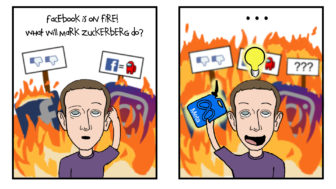
How does someone save their company from impending doom? According to Mark Zuckerberg, the CEO and founder of Facebook, rebranding is the solution. Meta, formerly Facebook, has recently been under fire for allegations against its algorithm’s involvement in misinformation, human trafficking and toxic beauty standards.
On Oct. 28, Zuckerberg revealed the new name for Facebook, inciting a maelstrom of backlash. Meta, according to Zuckerberg, means “beyond.” It gives the idea of “operating at a higher level,” like some kind of change has occurred. The irony of this is imminent and the media is more than aware of it. Zuckerberg explained that he wishes to expand beyond just Facebook and venture into the world of virtual reality. He wishes to create a mode through which people can experience real life from the comfort of their homes, hanging out with friends, conducting meetings, attending live concerts, playing games and much more all in virtual reality with avatars instead of people.
Zuckerberg’s very ambitious move has garnered criticism. Expanding into the metaverse would be detrimental to the growth of civilization and it’s hard not to agree when the next interaction people would look forward to is going out for coffee with their friend’s avatar. The idea sounds interesting, maybe even fun, but part of the joy of life is doing these activities in person. There was an extreme disconnect between people during the COVID-19 pandemic and now that we are getting back into the world again, it seems like a bad time to find a reason to stay home again.
Rebranding is a way for Meta to deflect recent allegations. Meta’s algorithm is built to keep people engaged and interested. When negative or extremist views become popular, the algorithm advertises these ideas to users because they seem to interest others, thereby spreading misinformation and dangerous ideas to a large number of people. This is extremely dangerous, especially for young children who rely on social media as entertainment.
“[Meta] owe[s] it to users to actually solve the problems”
Over the past few months, Meta has garnered bad press coverage concerning its involvement in various issues. As recently as October, a whistleblower named Frances Haugen released internal, confidential survey data that insinuated Meta was aware of the issues on its site and chose not to act. These problems include the effects of social media, namely Instagram, whose algorithm is contributing to body dysmorphia and unhealthy behavior in teenage girls by perpetuating unrealistic ideas of women’s appearances. Meta’s alleged knowledge of human traffickers using its platforms was also discussed, specifically its lack of constructive and effective responses to these threats. Other accusations include Meta’s inability to contain the spread of COVID-19 vaccine misinformation and the extremist ideals shared on the site that contributed to the insurrection on Jan. 6.
Meta is responsible for its apps. The people who created these sites have a duty to protect them. They owe it to users to actually solve the problems and make a conscious effort to make social media safer for everyone. Rebranding seems like a Hail Mary, a half-baked attempt at saving its smeared reputation. Until Meta’s issues are dealt with and solved, they will keep arising.



